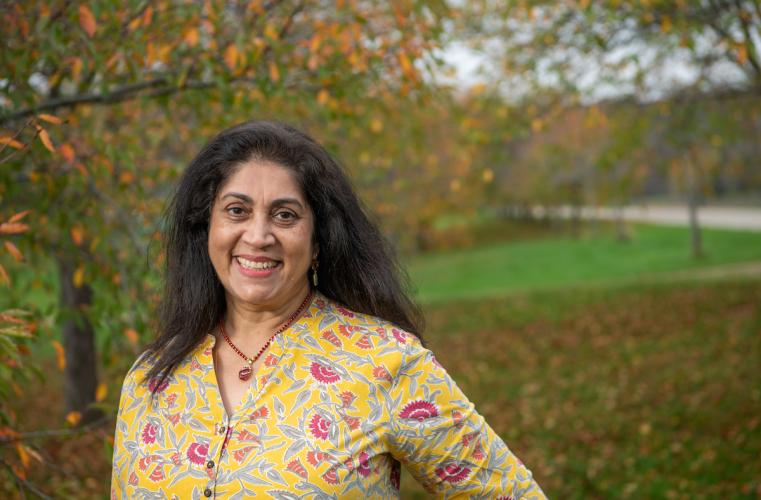

Dr. Christine Suniti Bhat, professor in the Department of Counseling and Higher Education in the Patton College of Education, received the prestigious American Counseling Association (ACA) Fellows Award in April 2024 and began her term as ACA President in July.
The ACA Fellows Award is a distinctive honor, recognizing members whose work has influenced, changed, and significantly advanced the counseling profession through their professional practice, scholarly achievement, leadership and governance, and mentoring.
Bhat has extensive experience in the United States and internationally as an educator, counselor, and psychologist in diverse work environments such as the Australian military, non-profit agencies, schools, and universities.
We spoke to Dr. Bhat about the award, her work, and her experience in her field.
Q & A With Dr. Christine Bhat
Q:Congratulations on your ACA Fellows award! What does winning this award mean to you personally and professionally?
A:Professionally - The award is a distinctive honor and the highest ACA award. It was a special moment because I received the honor in April 2024 at the National Conference in New Orleans, when I also took the oath of office to become the President of ACA from July 1, 2024, to June 30, 2025.
Personally – As an Asian woman, this award is a meaningful recognition of my work. I hope this accomplishment inspires other immigrants to contribute their skills and talents to the field of counseling.
Q:What made you want to pursue a career in counseling and higher education?
A:I completed a master’s degree in psychology in Bengaluru, India, and another in organizational psychology in Melbourne, Australia. I did my Ph.D. in counselor education and supervision at Ohio University. My plan at the time was to be a licensed professional counselor because of the opportunities to serve clients and help them overcome the obstacles they face – both within (e.g., negative self-talk) and outside of them (e.g., experiences of racism and heterosexism). But along the way, I fell in love with teaching. That motivated me to become a professor. Over the past 20 years, my focus has been on teaching and mentoring. I find this incredibly rewarding because the students of today are the counselors and counselor educators of tomorrow. I am inspired by my students, who are motivated by altruism, and want to help others work through their psychological pain.
Q: What are some of the challenges you have faced throughout your career? And on the other hand, what were some of your most positive experiences?
A:There are always challenges that one faces. I remind myself that everything is temporary, focusing on riding out the challenge or figuring out a way around it. I think having your support system, people you can talk to and trust when dealing with challenges, is necessary. I believe in seeking counseling when I need it. My positive experiences center around seeing my students succeed, thrive, and go on to become amazing counselors and professors themselves.
Q:Your research is extensive and encompasses many topics. What are some of the projects that have been the most meaningful or impactful for you?
A:Earlier in my career, my research focused on cyberbullying prevention. Recently, I have begun to read and research more on leadership and mentorship and positive psychological assets such as psychological capital (PsyCap), comprising Hope, Efficacy, Resilience, and Optimism. I think it is essential to focus on the things that help us to lead happy and fulfilled lives. We know we have a limited time on this planet, and I think we spend far too much time being hyper-focused on the things that drag us down. I am interested in the servant leadership model. A model that helps leaders focus on those they are leading and on the profession in which they lead.
Q:Are there challenging moments in this field that impacted you as a counselor and a person?
A:Major relocations have been challenging but also rewarding. I moved from Bengaluru, India (where I was born) to Melbourne, Australia, and I made a life there for nine years with my husband and my son. My daughter was born in Australia. I moved from Australia to Athens, Ohio, to join the Ph.D. in Counselor Education and Supervision .That was a big challenge – to adjust to life in rural Ohio after living in Melbourne. These are personal challenges. The pandemic opened our eyes to the extent of human suffering around the globe, and we are still struggling to understand the long-term ramifications. The loss and grief experienced by so many during that time, the loneliness and isolation, have shaped how we move forward. From an educator's perspective, the pandemic made us realize that education can be delivered online effectively, even in a field such as counseling. After the pandemic and with the help of funding from the provost’s office, the Counselor Education program developed and is offering a fully online school counseling program .
Q:What advice would you give students or people interested in a counseling and higher education career?
A:I think a desire to help others and help make the world a better place motivates many of us to enter these fields. Students and educators need to remember their initial impetus to enter a profession and not become jaded. I think it is important to be hopeful about the power of human connection.
Q:Outside of counseling, what are your favorite things to do?
A:Spending time with family, friends, and my two granddaughters! Spending time outdoors in beautiful Athens soaking in the calming green!!
Q:What are your aspirations and goals for the counseling world?
A:My aspirations are for the counseling profession to grow - that counselors will be compensated adequately for our work and that the shame and stigma associated with people seeking help from trained and licensed counselors will reduce with time.

